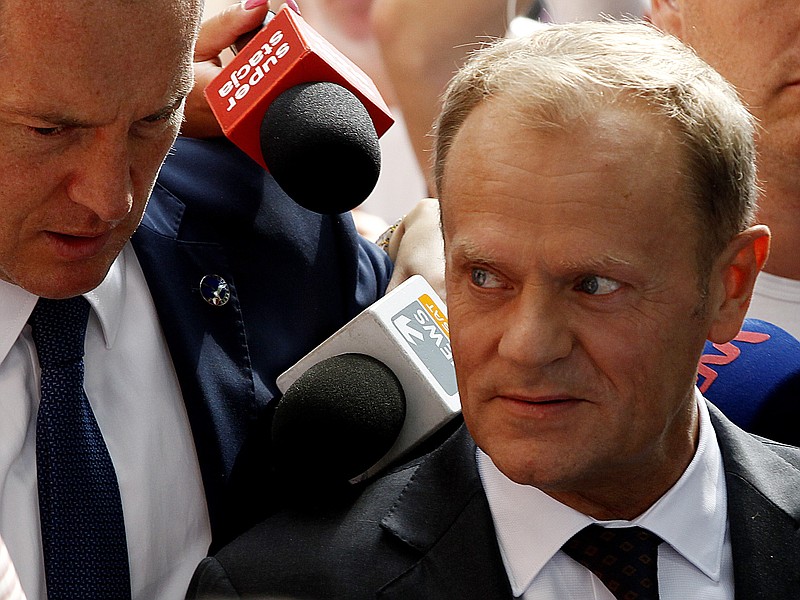WARSAW, Poland (AP) - Polish investigators questioned Donald Tusk, president of the European Council, for more than eight hours Thursday as a witness in an investigation into the 2010 plane crash that killed President Lech Kaczynski - a case widely seen as an attempt to discredit the EU leader by his longtime rival.
Ahead of the interrogation, Jaroslaw Kaczynski, the country's ruling party leader and the brother of the former president, said Tusk "should be afraid."
But Tusk emerged from the questioning by Polish prosecutors saying he would not be intimated by the proceedings, which his lawyer described as politically motivated.
"I do not have anything to fear. And Mr. Kaczynski will not scare me, no matter how badly he wants to get me," Tusk told reporters after the questioning ended.
He said for legal reasons he could not comment on the content of the questioning.
Tusk was the Polish prime minister at the time of the 2010 crash, which occurred in Russia and killed 96 people, many of them top Polish state and military officials.
Prosecutors said they are trying to determine why Polish authorities of the time did not take part in the autopsies, which were performed by Russians and later shown to be sloppy. Exhumations have revealed that some body parts got mixed up and were buried in the wrong graves.
Tusk's Polish supporters see the questioning as part of a bitter feud going back years that pits him against Kaczynski, the man who directs most government decisions now.
Kaczynski's latest steps include the conservative ruling party's attempts to put the justice system under his party's control. The European Union says the planned judicial changes erode the rule of law and has opened an infringement procedure against Poland.
Grzegorz Schetyna, head of the Civic Platform party that Tusk once led, called Thursday's questioning part of a "witch hunt." Katarzyna Lubnauer, a lawmaker with another opposition party, Modern, called it an act of "political revenge and an attempt to humiliate the former prime minister."
Tusk was also questioned as a witness in a separate investigation in April. Both then and on Thursday he was welcomed by cheering supporters and some detractors.
One of the EU's top leaders since 2014, Tusk is considered one of the most charismatic and effective politicians that Poland has had in many years, and the only one able to unite a weak and divided political opposition. Should he ever return to Polish politics, he would represent a major threat to Kaczynski.
Tusk - who has openly criticized the current Polish government - is often mentioned as a possible candidate in Poland's 2020 presidential election, which comes soon after his EU tenure is scheduled to end.
Kaczynski, a former prime minister who lost to Tusk's Civic Platform party in 2007, has long accused Tusk and Russia of responsibility for the aviation tragedy that killed his brother.
Tusk vehemently denies that, and accuses Kaczynski of cynically using the tragedy for political purposes.
